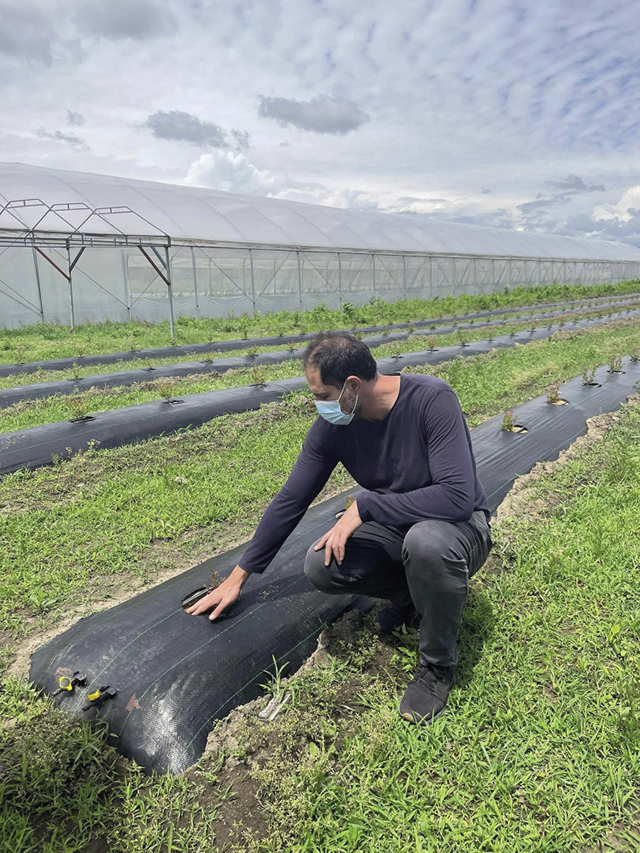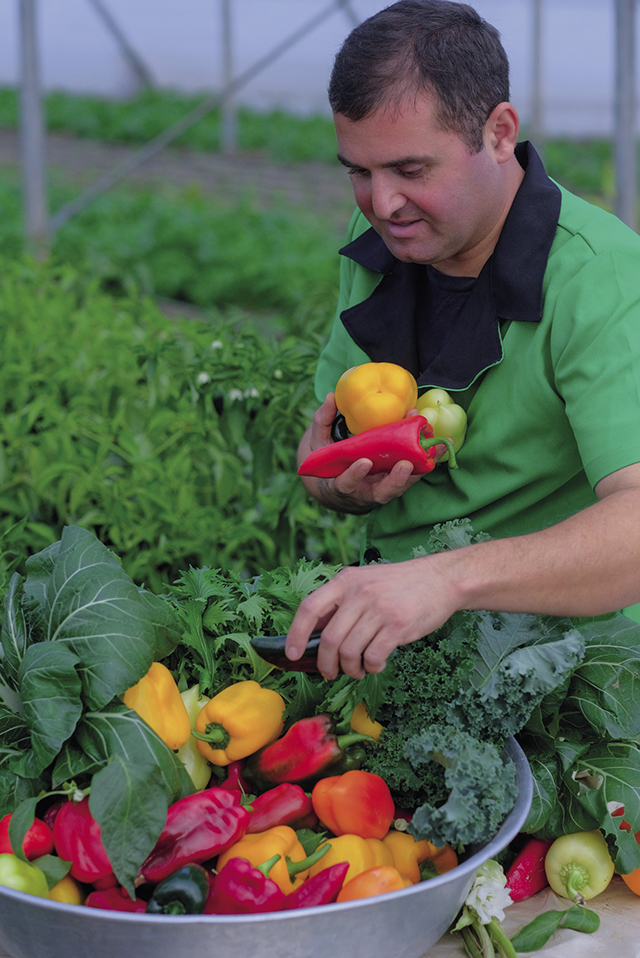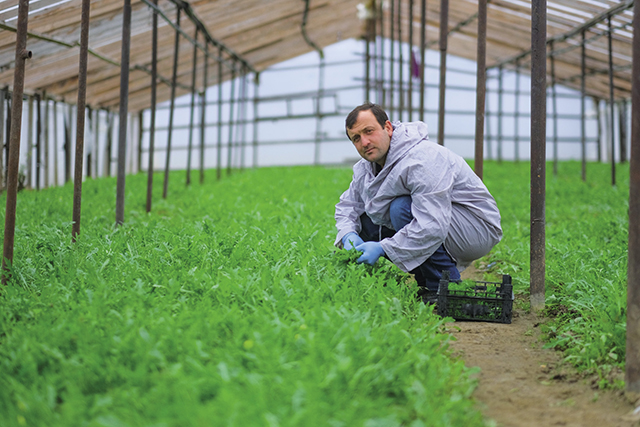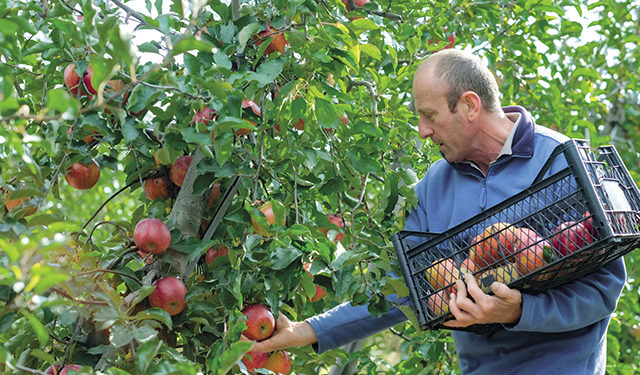Georgian farmers have a good opportunity to enter the European market, evidenced by the special quality and taste of our products.
GLOBALG.A.P. is an internationally recognized set of farming standards based on Good Agricultural Practices (GAP). The principal objective of the scheme is to ensure the safety and quality of agricultural products and sustainable practices among farmers, retailers, and consumers.
There is a strong and growing demand from consumers, retailers, suppliers, and producers in Georgia for food safety standards to be established, yet, today, micro and small farmers from Georgia are not always able to comply with international standards.
To address this, the Georgian Farmers Association (GFA), with the support of USAID through its ‘Zrda’ project, has developed a local standard, named GeoGAP, for primary agricultural products, at the initial stage dealing with fruits and vegetables.
Through GeoGAP, which is tailored to local conditions, the GFA is supporting local farmers in the process of adopting sustainable agricultural practices to be in line with food safety requirements, thus helping them to move towards European standards. In addition, this will help increase food safety on local markets and promote exports of high quality products from Georgia.
We spoke to three Georgian farmers who have already received their GeoGAP certification, and one who is on the way to getting his, while being well-aware that there are more such farmers in the pipeline aspiring to achieve this international-standard recognition.
Raising the Standard of Apple Growing
“I’ve had these orchards for ten years, and even now I’m in the process of constant learning and discovery,” says Giorgi Tediashvili, a GeoGAP Certified Farmer from Breti village, Kareli region.
Giorgi is an agronomist by profession. He was educated first in Georgia and then in Germany. The idea of running his own farm emerged many years ago. He knew exactly from the start that taking special care during the production process would be the key point and pillar of his activities.
He also knew he needed a team and an auxiliary system in his work, and the possibility of getting local certification from GeoGAP greatly appealed to him. The gradual implementation of the requirements of GeoGAP made his activities more consistent and of higher quality.
“You should grow your produce exactly as if it is intended for your own family members,” he tells us. “It’s a special feeling when you know that a product made by your hands is distinguished in quality, can only benefit consumers, and does no harm to the environment.”
Today, Giorgi cultivates seven varieties of apples, and is constantly working on experimental varieties, of which he boasts in excess of 50 types, with plans to expand further and produce new crops. With the introduction of GeoGAP certification and the production of a safe product, he is now able to offer distinguished quality products to customers on the local market and in doing so, to gain their trust. Further, he now has the opportunity to go beyond Georgia and try his hand in other countries.

Why would you advise farmers to work towards the GeoGAP standard themselves?
“If your goal is to produce a quality, safe product, and to constantly increase and expand production, you can consider GeoGAP a helper that will teach you and facilitate the path to safe, international quality production,” Giorgi tells us.
Branching out into Exotic Herbs
Kakha Tutberidze has been running a greenhouse in Rustavi for several years now, together with his family.
Initially, the goal was to cultivate well-known, traditional crops, but the course soon changed and they decided to grow “exotic” herbs that were totally new to Georgia. Today, their list of products includes Kale, Pak-Choi, Mizuna, and Fennel, the taste and aroma of which quickly captured their Georgian customers’ imagination.
The main precondition for stability for them was the GeoGAP certification program, with the help of which Kakha checks, observes and records all stages of production.
Kakha says that the main challenge for local farmers is acquiring new knowledge and getting acquainted with new technology.
“The standard on which our production is based, and which gives us the status of a safe producer, is crucial. GeoGAP certification is proof of the safety of our business, which opens the doors to many more partners and makes it easier to negotiate. You feel especially proud knowing you can be confident in the quality of your products and knowing that vegetables grown to these standards will compete with the products of countries with many years of agrarian tradition.”
Why would you advise farmers to work towards the GeoGAP standard themselves?
“Producing a quality and safe product will give local farmers completely new opportunities and take them to the next stage of production,” Kakha says.
“Imagine keeping harvest records that allow you to see the production process from a different angle and to focus on important details, to observe growth trends, compare results by year. Also, with the help of GeoGAP, it is easy to look at your production more broadly: to explore, to evaluate the environment where you grow the produce and to get significant results even with small improvements. Georgian farmers have a good opportunity to enter the European market and this is evidenced by the special quality and taste of our products.”

Vegetables from Imereti
“Such quality is given to us thanks to the approaches we have learned and tested through GeoGAP,” say Shalva Kupaladze and Giorgi Kukhianidze.
Greenhouse production by Shalva and Giorgi is a new continuation of their family business, aiming to establish a special quality of Imereti herbs on the local and international market.
A few years ago, their attending a seminar of a Dutch agro-specialist opened their eyes to a new opportunity. Back home, they shared their new knowledge with their fellow villagers, and in so doing laid the foundation for a new greenhouse unity. The name also came easily to them: ‘Vegetables from Imereti,’ and its producers are especially proud of the distinctive taste, aroma and quality of their produce.
“Constant quality control is an exercise to be in good shape, for you as a manufacturer and also for your produce, which shouldn’t be purchased by a customer only once: Demand for it must be stable and growing,” Shalva tells us. “GeoGAP will teach you exactly how to achieve this goal; how to produce a safe product, and how to make this fact a special feature of your production.”
Why would you advise farmers to work towards the GeoGAP standard themselves?
“Every farmer who looks at their business from a long-term perspective should understand that the near future belongs to safe products, and that the demand for them will increase. The easiest, most experienced, and tailored way to achieve this quality is to move to production of the GeoGAP standard,” Shalva says.

Blueberry Dreams
Giorgi Zakaraia, a farmer from the Samegrelo region, has been running a blueberry plantation since 2018. Currently, the plantation is spread over 9 hectares of land. It is a family business in which Giorgi’s parents and wife are also involved.
After living abroad for almost 20 years, Giorgi returned to his homeland, and instead of choosing a job in public service in Tbilisi, he decided to get involved in agriculture. Initially, he ran a hazelnut plantation in Samegrelo, however, after getting acquainted with the state program ‘Plant the Future’ and the advantages of cultivating blueberry, he set up a blueberry plantation in Zugdidi.
The farmer says that launching the plantation was a risk at that time due to a lack of relevant practice in the country, but the move led to success. Over three years, with Giorgi gaining experience and getting support through various state programs, the business has grown.
Now Giorgi’s goal is to further improve his production and bring it in line with international standards, and he plans to do so by obtaining GeoGAP certification. He believes that it will significantly help his business to develop, eventually enabling him to reach international markets.
Why would you advise farmers to work towards the GeoGAP standard themselves?
“Getting GeoGAP certification will prove our product is healthy and safe to human health and will also help in exporting our products to European markets,” Giorgi tells us.
“In my case, to achieve this goal, we’ve improved the infrastructure and production process. For instance, we’ve arranged a special area for refrigerators, where harvested blueberry should be cooled in accordance with quality standards. The construction will be completed by winter, with all the sanitary norms being strictly observed.
“Right now, we’re busy harvesting, and once the season is over, we’ll continue the process and work towards that GeoGAP certificate even more actively. I believe this will open a lot of new opportunities for our family business, increase awareness about our product, and attract more customers, making it easier for us to export to international markets and grow our business towards even more success.”
By Ana Dumbadze and Katie Ruth Davies














